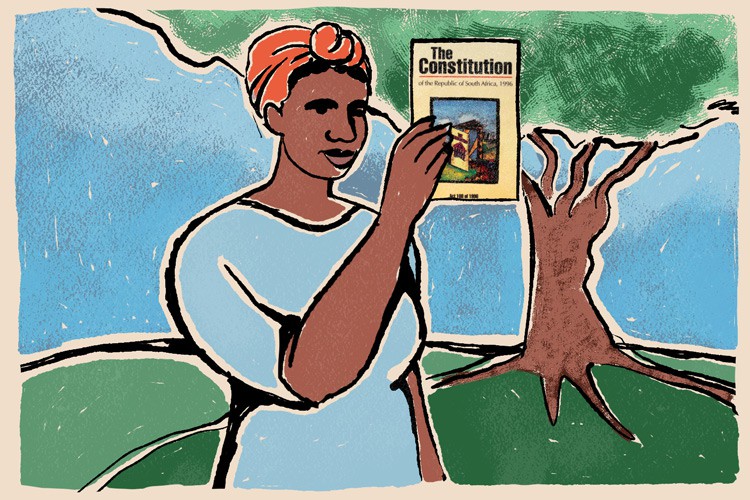Termination of Zimbabwean Exemption Permit declared unlawful, unconstitutional and invalid
Full bench of Pretoria High Court directs Home Affairs minister to conduct a fair process in reconsidering the end of the permits
There are nearly 180,000 Zimbabweans in South Africa with Zimbabwe Exemption Permits who were facing an uncertain future. Illustration: Lisa Nelson
- The decision by the Minister of Home Affairs to terminate the Zimbabwean Exemption Permit (ZEP) has been declared unlawful, unconstitutional and invalid.
- The Pretoria High Court has directed the minister to reconsider the issue “following a fair process”.
- The ZEP is extended until the end of June 2024.
The decision by the Minister of Home Affairs to terminate the Zimbabwean Exemption Permit programme has been declared unlawful, unconstitutional and invalid.
Three judges, sitting as a full bench in the Pretoria High Court, have directed the minister to reconsider the issue “following a fair process” that complies with the relevant laws.
Pending the outcome of that process, the permits will remain valid for another 12 months (until the end of June 2024), and ZEP-holders have protection from arrest and deportation.
The case was brought by the Helen Suzman Foundation and the Consortium for Refugees and Migrants in South Africa after the minister announced the end of the programme in 2021.
Subsequently he granted further extensions but remained adamant that the 178,000 permit holders must either apply for other visas, if they qualified for them, or return “home”.
In the much anticipated ruling on Wednesday, judges Colleen Collis, Gcina Malindi and Mandlenkosi Motha (writing as the court) said the minister had made no attempt to solicit representations from those affected before he took the decision.
The first call for representations had been done “after the fact” and was not a “genuine consultation”.
The invitation was “meaningless”, they wrote.
“By way of illustration, a ZEP-holder, Ms Maliwa, sent an email to the designated address imploring the Minister to ‘Please consider giving us another four years. We have nowhere to stay in Zim and no work.’
“To this email the minister’s attorneys responded that … the minister is unable to reverse the decision.”
The judges said throughout the answering affidavit (deposed to by the director-general of the department) there was a “notable disdain for the value of public participation”.
The judges said the minister’s failure to consult, rendered the decision to terminate the programme procedurally unfair and irrational.
They said no attempt was made to assess the impact on ZEP holders and their children.
“As a decision of this consequence impacts over 178,000 permit holders, it would have required proper information on who would be affected, to what degree and what measures were in place to ameliorate this impact.
“It further requires a careful assessment of the current conditions in Zimbabwe.
“Before this court, there is simply no admissible evidence from the Minister on whether he took these considerations into account and how.”
This was borne out by the fact that the director-general and the minister had been “entirely silent” on the impact on families and children in the court papers and in press statements.
The minister had also “flatly refused” to engage with any representations from the Scalabrini Centre, saying “there is no scope for reconsideration”.
On this basis, again, the decision had to be reviewed and set aside.
The minister had also not placed any facts before the court showing that he had consulted on conditions in Zimbabwe.
The judges said the decision was also an “unjustified” limitation of rights, and therefore must be reviewed and set aside in terms of the Promotion of Administration of Justice Act (PAJA).
The judges said their order would preserve the status quo pending the outcome of a fair process and the minister’s further decision.
They ordered that the minister pay the costs of the application.
The judges handed down a separate ruling in a matter they heard at the same time as the Helen Suzman case. This was brought by the Zimbabwean Immigration Federation for an interdict, stopping any action being taken against ZEP holders, pending a review of the minister’s decision.
The judges granted the interdict.
Support independent journalism
Donate using Payfast

Don't miss out on the latest news
We respect your privacy, and promise we won't spam you.
© 2023 GroundUp. This article is licensed under a Creative Commons Attribution-NoDerivatives 4.0 International License.
You may republish this article, so long as you credit the authors and GroundUp, and do not change the text. Please include a link back to the original article.
We put an invisible pixel in the article so that we can count traffic to republishers. All analytics tools are solely on our servers. We do not give our logs to any third party. Logs are deleted after two weeks. We do not use any IP address identifying information except to count regional traffic. We are solely interested in counting hits, not tracking users. If you republish, please do not delete the invisible pixel.

